Building an aquascape is a process of decoration by applying rocks, stones, wood, plants, or something like that. But someone enjoys the process and the happiness of a successful aquascape. In this article, we are likely to provide you with ideas for building an aquascape for a 20-gallon tank.
Content Table
Preparation for aquascape
To begin with, we will share the tools and equipment you should prepare in advance according to your needs.
Aquarium Tools
The aquarium tools include a substrate spatula, straight tweezers, curved tweezers, scissors, and a cleaning cloth. With these tools, you can build your aquascape more easily. In this case, an aquarium aquascaping tools kit can meet your demand exactly.
- Substrate spatula: move the gravel or sand and shape them into tanks.
- Straight tweezers & curved tweezers: adjust the rocks or place aquatic plants.
- Scissors: trim aquatic plants.
- Cleaning cloth: dry and clean the tools.
Aquascape adhesive & Instant gel
The aquascape adhesive is used to bond the rocks or stones and wood. And the instant gel can bond with aquatic plants.
Substrate
For better appearance, gravel and sand of various sizes and colors are usually applied. Aside from that, soil, such as aquarium soil, is another popular one. It provides nutrients for plants.
Aquarium decorations
There are different aquarium decorations, rocks, stones, wood, and mist makers for instance. But you should notice that not all rocks are suitable for your aquariums, you can read another article to learn more about aquarium rocks.
Aquarium light
Lighting is critically crucial for the aquarium ecosystem, which is the basis of photosynthesis and growth for plants. Another function of aquarium light is to make the colors of your fish, plants, or other creatures more vivid. Then your aquarium will become more appealing.
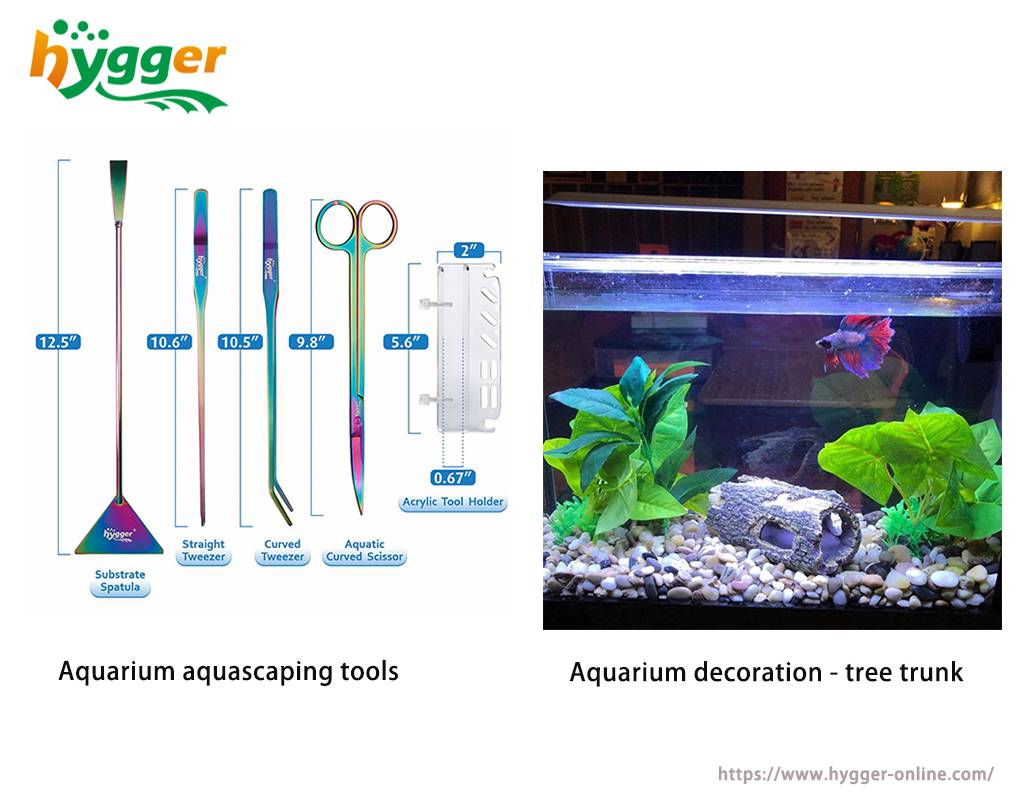
Steps to make an aquascape for a 20-gallon tank
You have an idea of the tools and equipment you will need. Soon, we will dive into specific steps to make an aquascape for an aquarium.
Step one: Determine the size and layout of the aquarium
First, we should determine the size of the aquarium. In this segment, we will take a 20-gallon tank as an example. Besides that, we should design the layout using our brains or draw it on paper.
Step two: Adding gravel
Before any operation, it is recommended to place a level of gravel on the bottom of the aquarium, supporting rocks. Then smooth the stone with a substrate spatula or your hands.
Step three: Adding rocks
Lay the rocks in the tank, and make sure they are stable. Then we can use aquascape adhesive to bone the rocks. By doing so, we can prevent the rocks from cracking or breaking the glass.
Step four: Adding wood
Place wood above the rocks. After placing them in an ideal manner, we can use aquascape adhesive to bone them with the rocks.
Step five: Adding sand and soil
Please notice here that do not mix the sand and soil. The aquarium is separated into three parts by the rocks. Then add the aquarium soil on the right and left side, and add the sand in the middle. Do not forget to smooth the sand and soil.
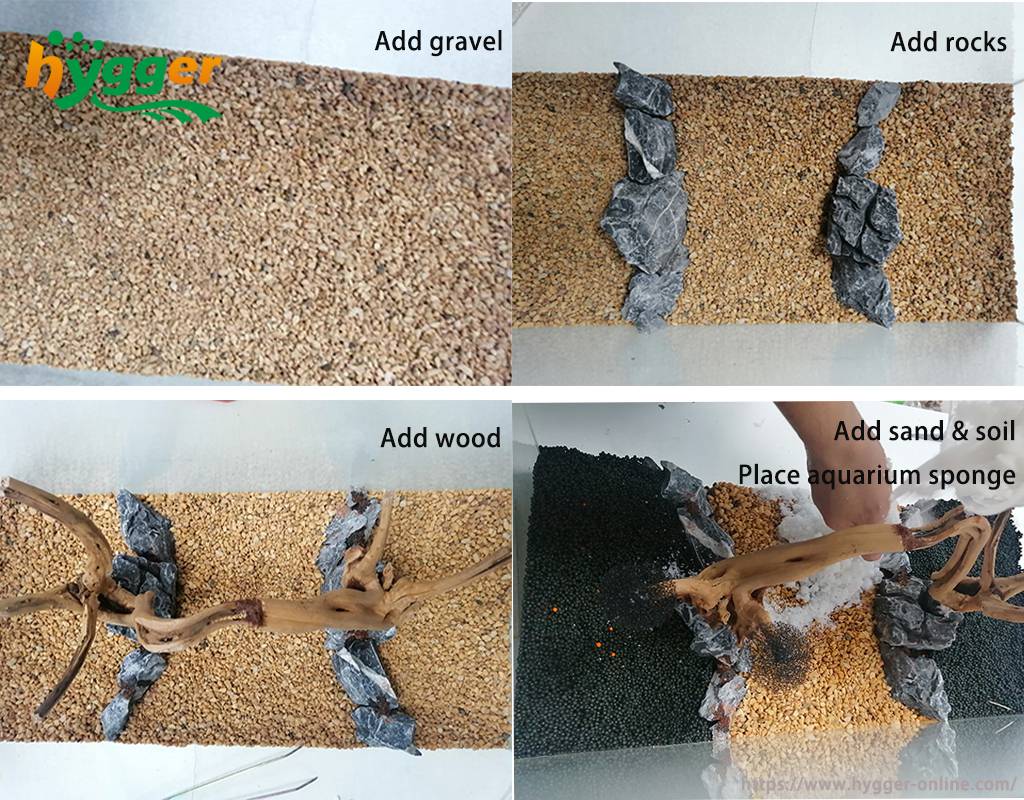
Step six: Place the aquarium sponge on the wood
Trim the aquarium sponge according to your requirements, and then place them on the wood. The sponge is for planting and growing plants.
Step seven: Planting aquatic plants
Before planting the aquatic plants, we can prune them with scissors. Next, plant them into the aquarium soil with the help of tweezers. On the other hand, we can apply some plants to decorate the wood, like moss.
Step eight: Adding water to the tank
Since the substrate is loose, the water in the tank will become cloudy if the substrate suffers a strong water flow. Therefore, we should put the aquarium sponge, a layer of plastic, or something like that above the soil and sand. After that, we can gently add water to the aquarium. However, it is better to make the water flow into the aquarium along the sponge. By the way, you can use a submersible pump or a cup to add water. Until the tank is filled up with water, do not forget to remove the aquarium sponge.
Step nine: apply the aquarium light and filter
After that, place the aquarium light and filter, and turn them on. The aquarium filter is essential for an aquarium. It can remove debris and cycle water in the tank.
Step ten: Change the water in your aquarium
The next day after adding water for the first time, you should change the water in the tank, then let it stand for about two days, finally, you can introduce fish into the aquarium after the tank cycle.
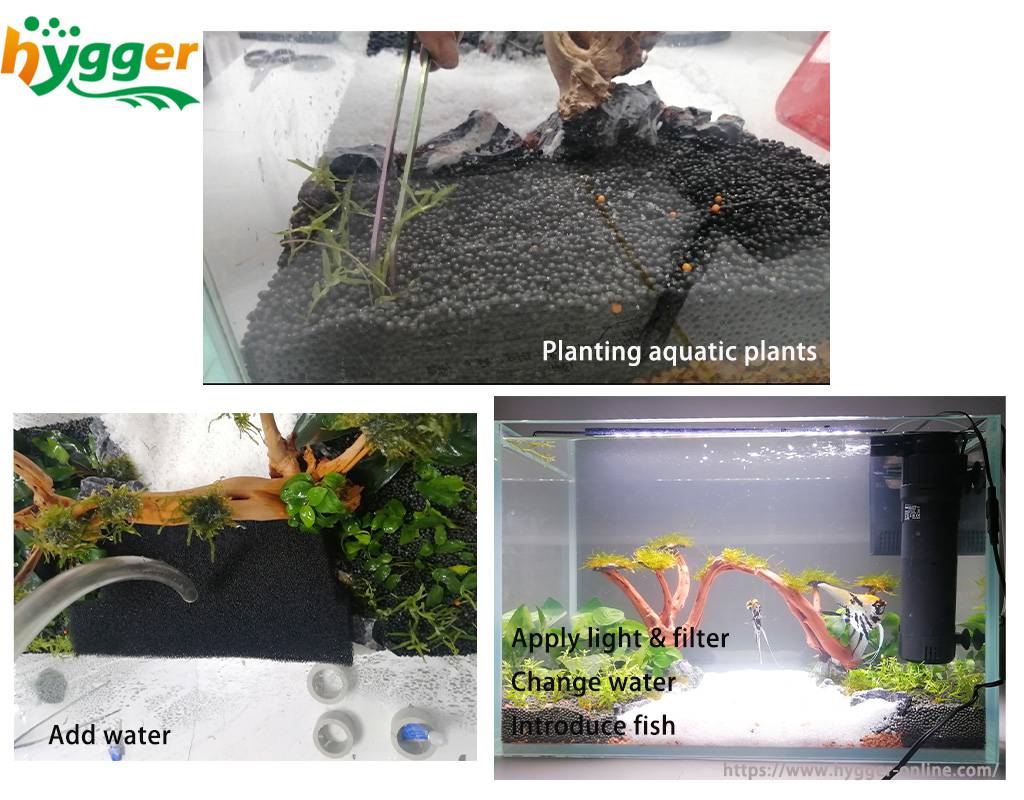
Tips for aquascape
Until now, we believe you have learned more about aquascape. For better aquascaping, there are also some tips.
- There are various styles of aquascape, including diorama aquascapes, Dutch aquascapes, biotope aquariums, iwagumis, jungle aquascapes, etc. You should determine the style you like before starting aquascaping.
- Besides that, it is better to keep about 1.5-2 inches of the substrate to develop the roots of plants. When you apply plants, they should be pushed down about 1 inch into the soil. Accordingly, the plants will not be loose and detaching.
- Moreover, fish, aquatic plants, and other creatures may possess different requirements for water parameters. You should research the suitable pH, GH, KH, and water temp for your tank, then test the water parameters in your tank.
- Furthermore, freshwater or saltwater tanks require different rocks or plants, you should research which one is ideal in advance and then choose the best one.
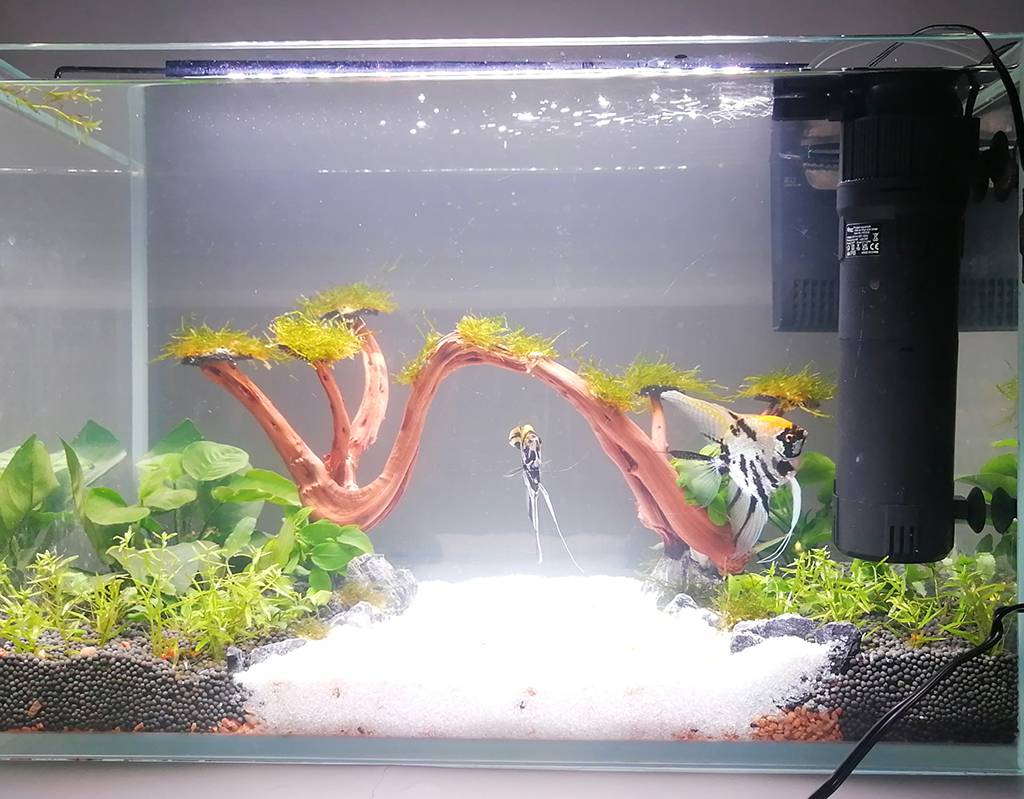
- On the other hand, the aquascape should follow the golden ratio. The small plants should be placed in the front of the aquarium, while the larger ones are usually placed at the back of the tank.
- When you add water to the aquarium, it is crucial to cover the soil or sand. You should reduce the impact of water on the substrate, as well as prevent the water from flowing into the tank directly by covering the aquarium sponge or other non-toxic objects. Or you can let the water flow through your hands, and then flow into your aquarium.
- More importantly, too many plants or decorations should be avoided in a fish tank. Please remember that fish require space to move and enjoy exploring around the tank.
- Rocks and stones are always the focal points of aquariums.
- After aquascaping, you should keep maintenance to make sure of the comfortable habitats.
More decoration ideas? You can go for another article – Make A Much More Dramatic Effect In A Fish Tank. Finally, thanks for your reading!
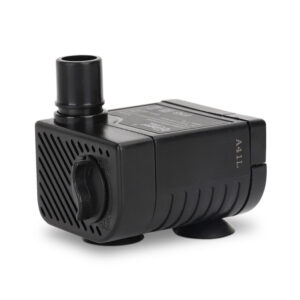
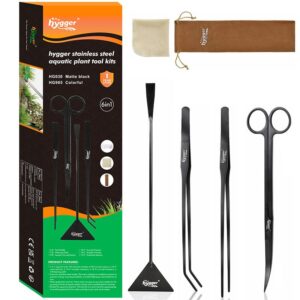
Leave a comment